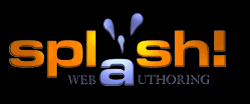












|
 Page Details
Page Details
Splash! uses the following information to help identify the page. Who wrote the
page and who holds the copyright. This information is important to Splash!, and is really only used
to show others (who look at the HTML), this information.
Page Title
Each web page is identified by a title. This option allows you to set a title for each page. Since this option
displays the information at the top of the browser, it is advised that the title is reflective of the page.
Page Filename
The pages that are contained in Splash!, when exported will be exported as this name. Splash! doesn't know
if you have a duplicate file name, so it is advised to leave the default that Splash!
creates, or choose your names carefully. For example an order page might be called order.html.
Page Description
Each page can also have its own description. This allows the people looking at the page, to see what it's all
about. It may even help you to work out what an old page was!
Page Keywords
When publishing your pages on the web, there are things called search engines. These engines help people find your
web site. Hence, we define a keyword that would be used to search for your page. When defining keywords, its
best to use words that are obvious. For example, what business are you in? What does your company or even yourself
offer that people might have a use for?. The list of these are endless, and there is no guarantee that your page
will be high on the list. It all depends on your keywords.
Page Creator Name
This helps identify the person who created this page. Although it is an option that can be set as a default, you may
have one page that you did not create. You can change this specifically for each page.
Page Creators Email
This option is the same as the Creator Name (above), and can be set as default. But also may be changed
just for this page.
Page Copyright
Again, as for the creators name and E-mail, you can change the Page Copyright. This too can be set as a default,
but this option will allow you to change just one specific page only.
Append Splash! Logo
If you are proud of what you used to create your home page with, and we hope you are. It would be nice to show others
what you used to create your masterpiece with.
Page Colors
Each page within Splash! can have its own definable colors, the following options are the choices available
to making your page look just right. Each option has a default color, but these may be changed to
accomodate the page or even just to your own tastes.
Page Statistics
The page statistics are a guide to help you judge how quickly your page will download. The guide would
help you if the page was graphically intensive. So that if you think it should be quicker, then
you can go back and look at reducing the content. This can be done by removing images all together,
or simply reducing them in size. Although Splash! allows you to resize the image on screen,
the image size will actaully remain the same. In this case you would need to use a graphic editor
to modify the image.
Page-Backgrounds
Each web page can have it's own background image. This option will allow you to load an image and
to apply it to the page. If you have already created a number of pages, you can apply the background to the entire project.
You don't need to have a background image, a color
can be applied instead and is done in the same fashion. If you like this image, and would like to use it over and over again,
then you can make it the default so that any time a new page is created, the image/colour will
be applied automatically.
Page Margin
This feature allows you to off-set the page to a definable degree from the left hand side of the
viewing area. What it does is simply push everything to the right, and helps prevent your page
from being jammed up against the side.
Page Goto
There are a few ways you can navigate through pages in Splash!. This option allows you choose which page you wish to go to.
Another way to navigate is by using the < or the > to advance or go back a page.
Page New
You don't have to limit your web site to just one page. You can have as many as you like,
selecting this will create a new blank page in your project.
Page Clear
This will clear the current page of all objects. Be careful with this one, you don't want
to lose any hard work. This feature will not remove any background picture, or color.
Page Delete
Again, another feature to be used with care. This will completely remove the current
page from the project. Remember, that you can not delete the first page of a document.
View HTML Source
This menu option allows you to view the HTML code, in it's raw format. This can be handy for the
more experienced HTML user.
Page Reload
There are times when working on pages, things on-screen will not always update visually.
Rather than reloading Splash!, you can use this menu option.
Copy this Page to New Page
Sometimes when creating pages, you may want multiple pages to use the same style.
This option will create a new page, and copy the entire contents of the
current page into this newly created page. Basically, an exact duplicate to make minimal changes easy.
|













